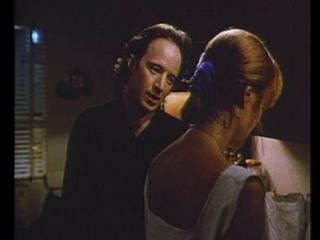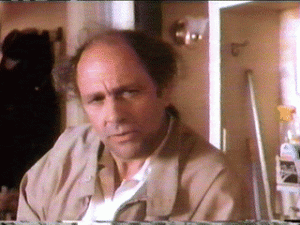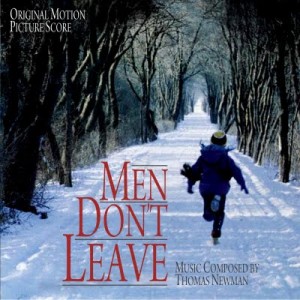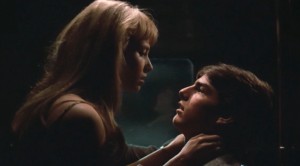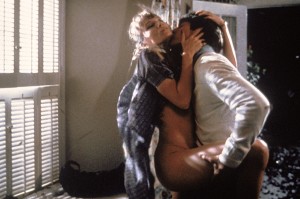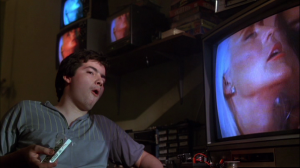From the Chicago Reader (March 2, 1990). — J.R.
MEN DON’T LEAVE ** (Worth seeing)
Directed by Paul Brickman
Written by Barbara Benedek and Brickman
With Jessica Lange, Chris O’Donnell, Charlie Korsmo, Arliss Howard, Joan Cusack, and Kathy Bates.
A central part of Paul Brickman’s talent as a director, apart from his skill with actors, is the use he’s made in his two features of the throbbing, semieuphoric rhythmic monotony of New Age music as a kind of figured bass to the melodic flights of his mise en scene. A master in orchestrating precise cuts, unorthodox camera angles, and camera movements that propel or embellish his story telling, Brickman may depend in part on slightly shopworn plots and familiar generic characters, at least as putative starting points. But he scores almost every time he articulates a fancy transition or highlights a telling detail, occasionally setting the story slightly adrift as he draws us into these lyrically abstract interludes. And the musical regularity of his scores — by Tangerine Dream in Risky Business (1983) and by Thomas Newman (son of Alfred and cousin of Randy) in Men Don’t Leave — tends to protect these well-crafted maneuvers, providing them with a kind of safety net (or, to alter the metaphor slightly, trampoline) from which he can make his expressive leaps.
Risky Business was a cynical teen pic with a bite in its tail, brilliantly realized yet also rather glib; there the cheerfully rattling and pulsing minimalist score was a perfect match for the complacencies of the story. Men Don’t Leave, which is far from cynical, sets out to tackle a genre with much richer possibilities — the soap opera or domestic weepie — and succeeds almost as well in certain respects; here the music is associated with the movie’s most sentimental character, a musician-composer who provides a steady flow of nonaggressive warmth, charisma, and support that is as fixed and as reliable as his music. The stated reason for the seven-year gap between Risky Business and Men Don’t Leave is that Brickman was waiting for just the right script. He finally came up with one by Barbara Benedek (The Big Chill, Immediate Family) — loosely based on Moishe Mizrahi’s La vie continue (1982), a fairly routine French picture with Annie Girardot — which he revised with the author. But Brickman is credited with the scripts for both Citizens Band (aka Handle With Care, 1977, directed by Jonathan Demme) and Risky Business, so the lag may also suggest writer’s block, or at least some form of tactical uncertainty.
As different as they were in other respects, both Citizens Band and Risky Business adroitly captured the zeitgeists of their separate periods, above all by burrowing into the dream lives and speculative self-images of their respective heroes. Citizens Band was about the secret, florid counteridentities of characters communicating with one another on CB radios in middle America while leading more humdrum and repressed everyday lives. Risky Business was about the dreams of sexual and entrepreneurial power entertained and eventually realized by a high school senior (Tom Cruise) when his parents are out of town. The new movie seems less specifically tied to the moods and preoccupations of a specific moment (i.e., the present), and the fleeting dreams it conjures up are more a matter of memory and anxiety. Its subject is the emotional crisis brought about in a family by the accidental death of the father (Tom Mason): the gradually unraveling effects of this on the mother, Beth Macauley (Jessica Lange), and the two sons, a moody boy of ten named Matt (Charlie Korsmo) and his surly older brother Chris (Chris O’Donnell). The family have to sell their suburban house to pay off debts and move a couple of hours away to Baltimore so that Beth can find more lucrative work. Charles (Arliss Howard), a divorced musician, is the substitute father figure who eventually comes into the picture. Beth goes to work for a cranky caterer (Kathy Bates), and her family begins to come apart at the seams: Matt teams up with a friend from school to burgle VCRs, hoping to raise enough money to help his mother out, and Chris is seduced by Jody (Joan Cusack), an older woman who lives in the same building — a ditzy hospital technician who is one of the film’s more original creations. Not yet ready to have a lover of her own, and therefore keeping a certain distance from Charles, Beth has a small breakdown after getting fired from her job.
The movie is organized around an image of family security that is not so much dreamed as remembered and eventually recaptured by Matt. He briefly narrates the beginning and ending of the film — a framing device used with Cruise in Risky Business — with an evocation of that security. He concludes each time with the words, “I was saved,” a near-religious feeling that is associated both times with family nurturing and depends both times on the presence of a father. Male bonding is evident in early scenes prior to the father’s death — most strikingly when the father and sons return from a movie that seems to bear a certain resemblance to Risky Business — and most of the later family discord comes from Beth struggling to make up for her husband’s absence. (Beth’s difficulty in taking charge makes her a far cry from a feminist role model, although Lange’s finely nuanced and unshowy performance makes her a lot more complex than a simple basket case.)
Both Risky Business and Men Don’t Leave possess a winning combo of stylistic strength and emotional honesty that is relatively rare in commercial movies; yet both pictures have idealized characters and implausible happy endings that compromise the honesty, if not the style. In the case of Risky Business (as Tom Cruise recently pointed out in an interview), this was partly a matter of studio interference, which ensured that the hero got accepted by Princeton, but it was also a matter of Rebecca De Mornay’s character being merely a fanciful dream, a fantasy prostitute constructed solely to take care of the hero’s needs. Charles, the benign composer in Men Don’t Leave — whom David Ansen in Newsweek has plausibly traced back to Alan Bates in An Unmarried Woman — seems similarly conceived almost exclusively as a figure who can take care of the Macauleys. Whether studio interference can be blamed this time for the hasty and improbable plot resolutions is not clear, but the consequences are even more problematic because this film lacks the escape clause of satire — unlike Risky Business, this film’s ending can’t be read two ways — either straight or cynical.
Moment to moment, Men Don’t Leave is a much better movie than the above strictures suggest, particularly if you’re willing to think of it less as a unified whole than as a string of individually realized moments. They come in all shapes and sizes: Chris’s parting words to Beth, “See you later, creator,” accompanied by a give-me-some-skin handshake as he departs from the breakfast table; some fatuous words of condolence to Beth after her husband’s funeral (“Buy yourself something, something really expensive — be surprised”); a couple of well-paced gags involving Beth’s brief stint at a checkout counter; and a remarkable transition covering the family’s move to Baltimore: there’s an imperceptible cut or dissolve from an upward crane shot moving above the Macauleys’ suburban backyard (where Matt lurks alone in his log-cabin playhouse, watched from afar by a couple of neighborhood girls) to a downward crane past their new apartment building in the city (which glides past Matt peering out the window, and ends on the street with Beth and the movers).
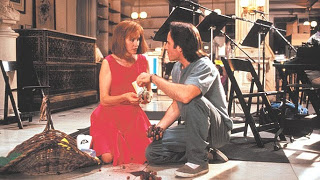
Many of these moments consist of behavioral observations in the script or performances: Chris’s starchy discomfort when Jody invites him to dinner and then takes him for a drive, and his tears when he urges Charles to see more of Beth; Matt’s defensive way of saying grace by himself at meals; Jody’s switch from the bedside manner of first person plural (“Why are we so groggy?”) to second person in order to elicit a response from Beth after she has stayed in bed for five days. Even if one remains unsatisfied with how Men Don’t Leave winds up, the movie is studded with small beauties throughout, provoking hopes that we won’t have to wait seven more years for Brickman’s next feature.


